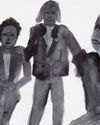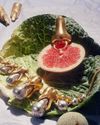
When the 34-year old Spanish architect Mar Vicens turned 16, her father got on his Vespa to begin the task he had undertaken for each of his three children: searching for a bit of property for her in the Serra de Tramuntana mountains on the northwestern coast of Mallorca. Although based half of the year in Valencia — Spain’s third largest city, an hour away by plane — the family also has roots going back generations in Mallorca, the largest of the Balearic Islands. The Tramuntanas, named a UNESCO World Heritage site in 2011, are sui generis, from both a geological and an aesthetic perspective: Fifty-five miles long, with summits of up to 4,700 feet, the one-time coral reefs from the Miocene era have eroded into sharp peaks that are sheared cleanly off in many places, dropping vertiginously to the sea.
While Mallorca’s southern beaches have been host to a massive Pan-European party scene since the 1970s, the Tramuntanas remain craggy and unspoiled. The ancient villages that punctuate the cliffs — the island was settled in prehistoric times and claimed over the centuries by Phoenician, Roman and Moorish invaders — have long attracted cultured bohemians, including the British writer Robert Graves, who in 1929 moved to the town of Deià with his lover, the American poet Laura Riding, and mostly remained there until his death in 1985.
Denne historien er fra November 2019-utgaven av T Singapore: The New York Times Style Magazine.
Start din 7-dagers gratis prøveperiode på Magzter GOLD for å få tilgang til tusenvis av utvalgte premiumhistorier og 9000+ magasiner og aviser.
Allerede abonnent ? Logg på
Denne historien er fra November 2019-utgaven av T Singapore: The New York Times Style Magazine.
Start din 7-dagers gratis prøveperiode på Magzter GOLD for å få tilgang til tusenvis av utvalgte premiumhistorier og 9000+ magasiner og aviser.
Allerede abonnent? Logg på

Look At Us
As public memorials face a public reckoning, there’s still too little thought paid to how women are represented — as bodies and as selves.

Two New Jewellery Collections Find Their Inspiration In The Human Anatomy
Two new jewellery collections find their inspiration in the human anatomy.

She For She
We speak to three women in Singapore who are trying to improve the lives of women — and all other gender identities — through their work.
Over The Rainbow
How the bright colours and lively prints created by illustrator Donald Robertson brought the latest Weekend Max Mara Flutterflies capsule collection to life.

What Is Love?
The artist Hank Willis Thomas discusses his partnership with the Japanese fashion label Sacai and the idea of fashion in the context of the art world.

The Luxury Hotel For New Mums
Singapore’s first luxury confinement facility, Kai Suites, aims to provide much more than plush beds and 24-hour infant care: It wants to help mothers with their mental and emotional wellbeing as well.

Who Gets To Eat?
As recent food movements have focused on buying local or organic, a deeper and different conversation is happening among America’s food activists: one that demands not just better meals for everyone but a dismantling of the structures that have failed to nourish us all along.

Reimagining The Future Of Fashion
What do women want from their clothes and accessories, and does luxury still have a place in this post-pandemic era? The iconic designer Alber Elbaz thinks he has the answers with his new label, AZ Factory.

A Holiday At Home
Once seen as the less exciting alternative to an exotic destination holiday, the staycation takes on new importance.
All Dressed Up, Nowhere To Go
Chinese supermodel He Sui talks about the unseen pressures of being an international star, being a trailblazer for East Asian models in the fashion world, and why, at the end of the day, she is content with being known as just a regular girl from Wenzhou.